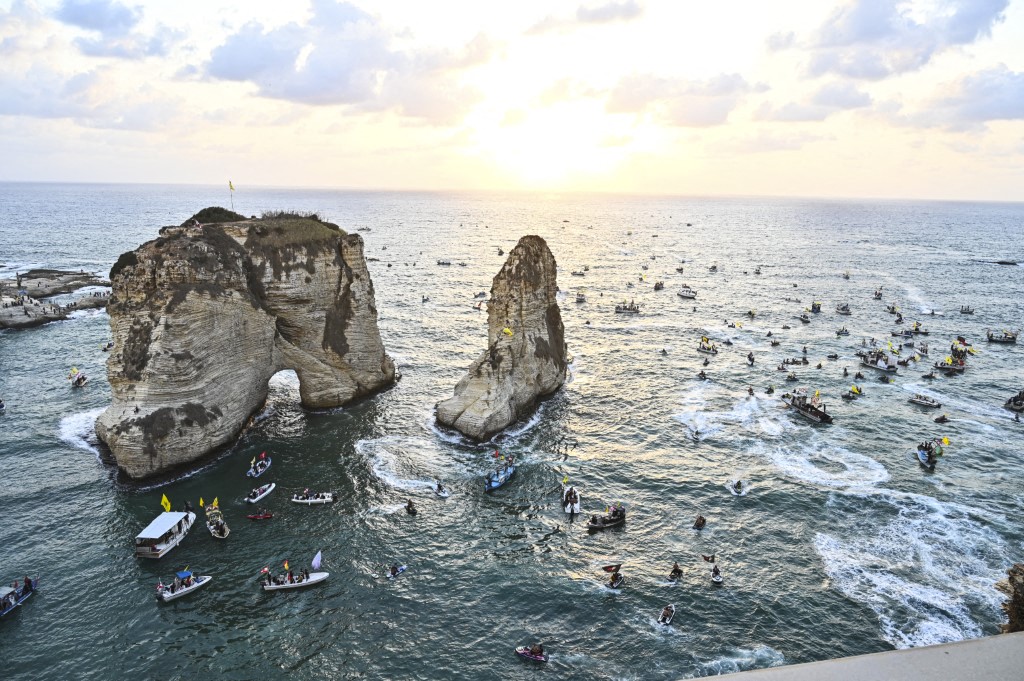"Hezbollah” has claimed a “resounding victory” in the battle of Raouche Rock. The group “occupied” the sidewalks overlooking the site, deployed its boats around the landmark, and illuminated it with the images of its two slain leaders. It delivered its message to the government and imposed its will.
Meanwhile, the prime minister was left standing alone against a fierce campaign unleashed by “Hezbollah”'s proxies. Although the “party” itself has refrained from directly attacking him, its proxies, bedeviled the prime minister, with some even branding him a “Zionist” during the commemorations.
Why? Because the Prime Minister insisted on applying the government’s pledge to extend state sovereignty over all Lebanese territory, including the exclusive control of arms by legitimate military and security forces. He also issued a directive instructing security agencies to prohibit anyone from using national or historic landmarks—such as Raouche Rock—for political purposes. Even two “Hezbollah”-affiliated MPs signed an agreement with the Governor of Beirut, in the presence of the minister of interior, pledging not to light up the rock. But the surge of emotion on the anniversary overrode that commitment.
The party staged its show of force to signal that it still holds the upper hand in Lebanon’s decision-making. But in reality, that is no longer the case.
The Unfulfilled Promises of Disarmament
Contrary to what “Hezbollah” claims, the ceasefire agreement it once embraced actually requires the dismantling of all its military structures and the surrender of its weapons across Lebanese territory. That has never happened—and, judging by Secretary-General Naim Qasem’ recent pledge, never will. One “Hizbollah” MP even revealed that they had reached an understanding with presidential candidate Joseph Aoun between the two parliamentary voting sessions that it would surrender its weapons only in the area south of the Litan River. It is only then that the “party” voted for him. If true, this would mean the “party” received a pledge from someone who could not grant it.
As long as illegal armed structures are not dismantled and weapons are not surrendered, Israel will not withdraw from the occupied points, reconstruction will not begin, and the displaced will not return.
This raises direct questions for “Hezbollah”: What matters more—illuminating Raouche Rock or securing Israel’s withdrawal, rebuilding the South, or enabling displaced families to return to their homes?
The Contradictions of Armed Resistance
“Hezbollah’s” secretary general statement—“we will not leave the battlefield, and we will not surrender our weapons”—also begs further questions. Where exactly is this “battlefield”? It should be on Lebanon’s border with Israel. Where is the party positioned now? From where does it intend to use its weapons against Israel? What is the value of arms stockpiled in the Bekaa Valley, Beirut’s southern suburbs, or elsewhere, if they are not deployed on the front lines? And indeed, they are not.
The fear is that Israel’s continuing occupation becomes the excuse for “Hezbollah” to keep its weapons, and that “Hezbollah” keeping its weapons becomes the excuse for Israel’s continuing occupation.
Lebanon’s Waning Influence
These concerns gain weight in light of recent comments by U.S. presidential envoy Tom Barrack, a Lebanese American, who spoke of the Lebanese state’s “all talk and no action,” and in light of the lukewarm reception accorded to Lebanon’s president on the international stage.
His speech at the UN General Assembly was scheduled late at night Beirut time, meaning most Lebanese only learned its content the next day.
His official schedule in New York lacked meetings with senior Arab and European leaders, including French President Emmanuel Macron, and Saudi Arabian officials who are organizing a conference to support Lebanon’s army.
The only meeting with high-level U.S.officials was a brief meeting with Secretary of State Marco Rubio, while Syrian President Ahmad al-Shar’a, met with President Trump twice.
Despite both being in New York, President Aoun did not meet his Syrian counterpart, except for a passing hand shake.
Please post your comments on:
[email protected]
 Politics
Politics








